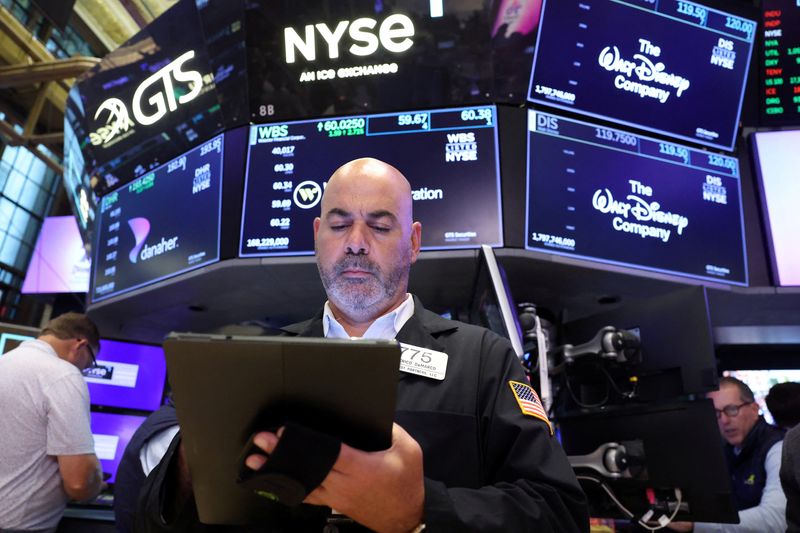Flutter Entertainment beats Q3 earnings estimate despite sports results impact
Investing.com - Futures tied to major U.S. stock markets point up, with the House of Representatives likely to soon vote on a bill to reopen the federal government following a more than 40-day shutdown. Republicans who control the House are confident the funding measure will be approved in the lower chamber of Congress, after it was cleared by the U.S. Senate earlier this week. If the shutdown ends, a deluge of postponed economic data awaits Federal Reserve policymakers who are reportedly divided over the path ahead for interest rates. Elsewhere, networking equipment firm Cisco Systems is due to report at a time when concerns around massive expenditures on artificial intelligence have started to emerge.
1. Futures edge higher
U.S. stock futures inched higher on Wednesday, as lawmakers in Washington were poised to vote on a deal to end the longest-ever federal government shutdown.
By 02:39 ET (06:39 GMT), the Dow futures contract had risen by 78 points, or 0.2%, S&P 500 futures had climbed by 25 points, or 0.4%, and Nasdaq 100 futures had gained 170 points, or 0.7%.
The main averages on Wall Street ended in mixed fashion on Tuesday, as a revenue outlook cut from cloud services group CoreWeave dented sentiment around the AI boom and weekly jobless claims data from payroll services firm ADP pointed to a downturn in labor market momentum.
Still, there was strength in other parts of the market, with analysts at Vital Knowledge suggesting that market participants were trying to "stay invested" ahead of a potential year-end rally.
2. U.S. House expected to vote on bill to end government shutdown
Lawmakers in the U.S. House of Representatives are due to vote on a compromise which would end an historically-long government shutdown.
Hopes that the government will soon reopen were bolstered earlier this week, when the U.S. Senate approved a bill to secure federal funding for most agencies until January 30. Notably, eight Senate Democrats backed the measure, breaking an impasse between their party and President Donald Trump’s Republicans in the upper chamber of the U.S. Congress.
Should the GOP-controlled House vote in favor of the legislation as anticipated, Trump is expected to sign it into law.
For financial markets, reopening the government would mean the return of several official economic indicators, including a monthly jobs report, which have been delayed by the shutdown. These data points are crucial because they help investors and policymakers alike assess the state of the U.S. economy.
3. Fed torn over December rate decision - WSJ
The data blackout has made the path ahead for Federal Reserve interest rates particularly murky, leaving the outcome of the central bank’s final monetary policy meeting in December largely uncertain.
According to the Wall Street Journal, Fed members remain divided on whether to cut rates at the gathering, after having slashed borrowing costs by 25 points at prior two meetings in October and September.
At issue is the trajectory of employment growth and inflation, the Fed’s twin mandates.
On one hand, some policymakers have argued that rapid cuts are necessary to stimulate hiring and investment in a cooling labor market, although others have flagged worries that more reductions could reignite price gains.
Without fresh economic data, bridging this divide has proved difficult among Fed officials, the WSJ reported.
4. Cisco to report
On the earnings calendar, markets will be keeping close tabs on results from networking gear provider Cisco Systems after the closing bell on Wall Street.
Cisco has faced a solid backdrop in recent months, underpinned by the surge in enthusiasm for AI, which has fueled soaring hyperscale cloud investments and driven IT infrastructure financing.
In August, CEO Chuck Robbins said AI infrastructure orders had surpassed $800 million in Cisco’s fiscal fourth quarter, pushing up the total for the full-year period to more than $2 billion.
Robbins added that the "sovereign AI opportunity" will gather momentum in the second half of its fiscal 2026, cementing Cisco’s position as a "core system provider for these significant AI training and inference cluster build outs [...] integral to their development and eventual hyperscaling."
The company is seen posting fiscal first-quarter adjusted earnings per share of $0.98 on revenue of $14.77 billion, according to Bloomberg consensus estimates.
5. Chevron investor day ahead
A strategy update on Wednesday at U.S. oil major will Chevron likely feature a focus on CEO Mike Wirth’s plan to begin a new phase of growth following a massive $55 billion acquisition of smaller peer Hess.
The event, which will see executives and top shareholders meet in New York City, comes after the company completed the Hess merger in July.
One of the oil industry’s biggest transactions in years, the Hess deal has been the centerpiece of a push by Wirth to improve Chevron’s returns. Crucially, the sale includes Hess’ 30% stake in a consortium with Exxon and China’s CNOOC which has discovered over 11 billion barrels of oil in Guyana’s Stabroek offshore block.
Analysts have said that the discovery has potential recoverable oil of roughly 20 billion barrels, making it a key strategic pillar for Wirth, who could face questions around Chevron’s exploration plans after oil and gas reserves touched a low point in 2024.
"We continue to believe Chevron paid a full price for Hess," analysts at Wolfe Research said in a note. They added that longer-term questions have also swirled around the future of Chevron’s operations in Kazakhstan, which are estimated to account for about 18% of free cash flow next year and 20% between 2026 and 2030.
"Addressing this and a relatively mature shale portfolio in acquired assets will be key issues at the upcoming Investor Day."
